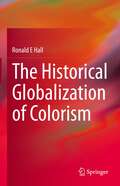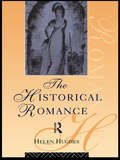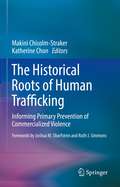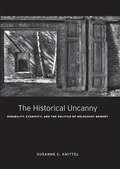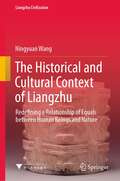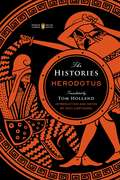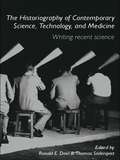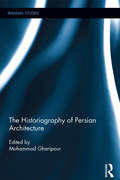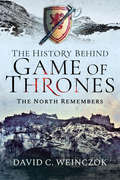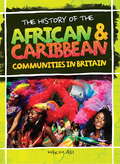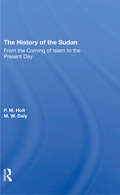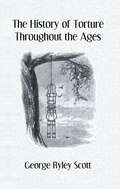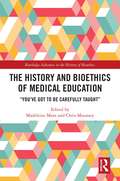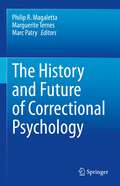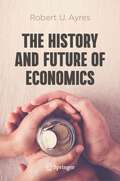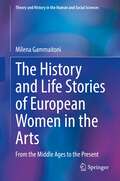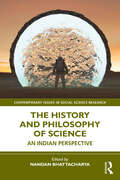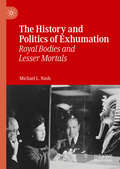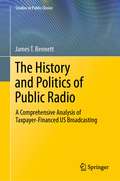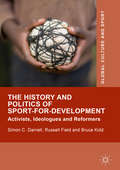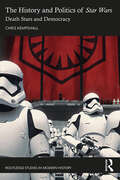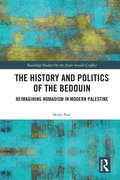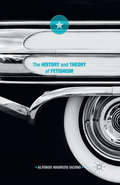- Table View
- List View
The Historical Globalization of Colorism
by Ronald E HallThis topical book shows that racism by skin color is much more embedded and prevalent in the modern world than racism by race. In the aftermath of globalization, humanity has experienced unprecedented levels of interaction. This book presents evidence to show that in the 21st century which is dependent on ever-expanding communication technologies, and new forms of visual media actually exacerbate historical mores of colorism in the lives of humanity, i.e.: African, Asian, Latinx, Native and European descent. The book discusses the historical roots and current values of idealization of light skin, skin bleaching practices, stereotypes of skin color developed through migration and cultural assimilation, and health and educational consequences of colorism.
The Historical Romance (Popular Fictions Series)
by Helen HughesThe Historical Romance explores the ways in which romance authors seek to represent our fantasies of life in the past. Examining how the cut-and-thrust swashbucklers of the 1930s gave way to female-orientated romances, Helen Hughes takes a comprehensive look at how romance authors have dealt with the turbulent question of female independence, and how traditional attitudes towards love, marriage and women's sexuality have been approached in more recent texts. Hughes also charts the ways in which the marketing of romance has developed, with the eventual explosion of the mass market and the blockbusting family sagas of the eighties. The Historical Romance unravels the formulaic and mythical nature of historical romance to provide a fascinating study of this highly popular genre.
The Historical Roots of Human Trafficking: Informing Primary Prevention of Commercialized Violence
by Makini Chisolm-Straker Katherine ChonA public health approach to human trafficking requires a nuanced understanding of its root causes. This textbook applies a historical lens to human trafficking from expert resources for the multidisciplinary public health learner and worker. The book challenges the anti-trafficking paradigm to meaningfully understand historical legacies of present-day root-causes of human trafficking. This textbook focuses on history’s utility in public health. It describes history to contextualize and explain present times, and provides public health lessons in trafficking prevention and intervention. Public health recognizes the importance of multiple systems to solve big problems, so the chapters illustrate how current anti-trafficking efforts in markets and public systems connect with historical policies and data in the United States. Topics explored include:Capitalism, Colonialism, and Imperialism: Roots for Present-Day Trafficking Invisibility, Forced Labor, and Domestic Work Addressing Modern Slavery in Global Supply Chains: The Role of Businesses Immigration, Precarity, and Human Trafficking: Histories and Legacies of Asian American Racial Exclusion in the United StatesSystemic and Structural Roots of Child Sex Trafficking: The Role of Gender, Race, and Sexual Orientation in Disproportionate VictimizationThe Complexities of Complex Trauma: An Historical and Contemporary Review of Healing in the Aftermath of Commercialized Violence Historical Context Matters: Health Research, Health Care, and Bodies of Color in the United States Understanding linkages between contemporary manifestations of human trafficking with their respective historical roots offers meaningful insights into the roles of public policies, institutions, cultural beliefs, and socioeconomic norms in commercialized violence. The textbook identifies sustainable solutions to prevent human trafficking and improve the health of the Nation.The Historical Roots of Human Trafficking is essential reading for students of public health, health sciences, criminology, and social sciences; public health professionals; academics; anti-trafficking advocates, policy-makers, taskforces, funders, and organizations; legislators; and governmental agencies and administrators.
The Historical Uncanny: Disability, Ethnicity, and the Politics of Holocaust Memory
by Susanne C. KnittelThe Historical Uncanny explores how certain memories become inscribed into the heritage of a country or region while others are suppressed or forgotten. In response to the erasure of historical memories that discomfit a public’s self-understanding, this book proposes the historical uncanny as that which resists reification precisely because it cannot be assimilated to dominant discourses of commemoration.Focusing on the problems of representation and reception, the book explores memorials for two marginalized aspects of Holocaust: the Nazi euthanasia program directed against the mentally ill and disabled and the Fascist persecution of Slovenes, Croats, and Jews in and around Trieste. Reading these memorials together with literary and artistic texts, Knittel redefines “sites of memory” as assemblages of cultural artifacts and discourses that accumulate over time; they emerge as a physical and a cultural space that is continually redefined, rewritten, and re-presented.In bringing perspectives from disability studies and postcolonialism to the question of memory, Knittel unsettles our understanding of the Holocaust and its place in the culture of contemporary Europe.
The Historical and Cultural Context of Liangzhu: Redefining a Relationship of Equals between Human Beings and Nature (Liangzhu Civilization)
by Ningyuan WangThis book clarifies the advent of Liangzhu Culture and analyses the morphology, structure and internal social organization of grass-root settlements, medium-size settlements and the ancient city of Liangzhu, as well as the religious beliefs, ideology and power mechanisms represented by jade. Further, the book explains how the low-lying location and humid environment in the water-net plain area prompted the creation of man-made platforms or pillars, forming small and densely settled residential areas, and ultimately the water villages of southern China. Developments between man and nature accelerated the process of civilization, leading to the polarization of social classes and pyramid-shaped residential structures containing cities, towns and villages. Offering unique insights into the social vitality and structure of Liangzhu society, the book is one of the most important academic works on interpreting the origins of Liangzhu Civilization and investigating Chinese Civilization.
The Histories
by Herodotus Tom Holland Paul CartledgeHerodotus is not only the father of the art and the science of historical writing but also one of the Western tradition's most compelling storytellers.<P><P> In tales such as that of Gyges--who murders Candaules, the king of Lydia, and unsurps his throne and his marriage bed, thereby bringing on, generations later, war with the Persians--he laid bare the intricate human entanglements at the core of great historical events. In his love for the stranger, more marvelous facts of the world, he infused his magnificent history with a continuous awareness of the mythic and the wonderful. (Book Jacket Status: Jacketed)ble reading once more.
The Historiography of Contemporary Science, Technology, and Medicine: Writing Recent Science (Routledge Studies in the History of Science, Technology and Medicine #Vol. 23)
by Ronald E. Doel Thomas SöderqvistAs historians of science increasingly turn to work on recent (post 1945) science, the historiographical and methodological problems associated with the history of contemporary science are debated with growing frequency and urgency. Bringing together authorities on the history, historiography and methodology of recent and contemporary science, this book reviews the problems facing historians of technology, contemporary science and medicine, and explores new ways forward. With contributions from key researchers in the field, the text covers topics that will be of ever increasing interest to historians of post-war science, including the difficulties of accessing and using secret archival material, the interactions between archivists, historians and scientists, and the politics of evidence and historical accounts.
The Historiography of Persian Architecture (Iranian Studies)
by Mohammad GharipourHistoriography is the study of the methodology of writing history, the development of the discipline of history, and the changing interpretations of historical events in the works of individual historians. Exploring the historiography of Persian art and architecture requires a closer look at a diverse range of sources, including chronicles, historical accounts, travelogues, and material evidence coming from archaeological excavations. The Historiography of Persian Architecture highlights the political, cultural, and intellectual contexts that lie behind the written history of Persian architecture in the twentieth century, presenting a series of investigations on issues related to historiography. This book addresses the challenges, complexities, and contradictions regarding historical and geographical diversity of Persian architecture, including issues lacking in the 20th century historiography of Iran and neighbouring countries. This book not only illustrates different trends in Persian architecture but also clarifies changing notions of research in this field. Aiming to introduce new tools of analysis, the book offers fresh insights into the discipline, supported by historical documents, archaeological data, treatises, and visual materials. It brings together well-established and emerging scholars from a broad range of academic spheres, in order to question and challenge pre-existing historiographical frameworks, particularly through specific case studies. Overall, it provides a valuable contribution to the study of Persian architecture, simultaneously revisiting past literature and advancing new approaches. This book would be of interest to students and scholars of Middle East and Iranian Studies, as well as Architectural History, including Islamic architecture and historiography.
The History Behind Game of Thrones: The North Remembers
by David C. WeinczokThe true history behind the hit HBO fantasy show and George R. R. Martin&’s bestselling Fire and Ice series. A wall in the distant north cuts the world in two. Ruthless sea-born warriors raid the coasts from their war galleys. A young nobleman and his kin are slaughtered under a banner of truce within a mighty castle. A warrior king becomes a legend when he smites his foe with one swing of his axe during a nation-forging battle. Yet this isn&’t Westeros—it&’s Scotland. Game of Thrones is history re-imagined as fantasy. The History Behind Game of Thrones turns the tables, using George R. R. Martin&’s extraordinary fictional universe as a way to understand the driving forces and defining moments from Scotland&’s story. Why were castles so important? Was there a limit to the powers a medieval king could use—or abuse? What was the reality of being under siege? Was there really anything that can compare to the destructive force of dragons? By joining forces, Westeros and Scotland hold the answers. Writer and presenter David C. Weinczok draws on a vast array of characters, events, places, and themes from Scottish history that echo Game of Thrones at every dramatic turn. Visit the castle where the real Red Wedding transpired, encounter the fearsome historical tribes beyond Rome&’s great wall, learn how a blood-red heart became the most feared sigil in Scotland, and much more. By journey&’s end, the cogs in the wheels of Martin&’s world and Scottish history will be laid bare, as well as the stories of those who tried to shape—and sometimes even break—them.
The History Of The African & Caribbean Communities In Britain (The History Of #1)
by Hakim AdiDiscover the fascinating history of African and Caribbean communities in Britain, from pre-Roman times to the 21st Century.Newly updated, The History of African and Caribbean Communities in Britain explores why people came to Britain, the problems they faced and the contributions these communities have made to British society. Brought to life with case studies and rarely published photographs, this is an opportunity to get up close to the experiences and vital impact African and Caribbean people have had in Britain. Meet pioneers such as Olaudah Equiano and Phyllis Wheatley and find out why African and Caribbean communities have been fundamental to Britain's success on the world stage. Written by British historian and academic Prof. Hakim Adi, a specialist on the history of Africa and the African diaspora, this book is essential reading for children aged 11+ and anyone interested in learning about the history of these communities in Britain.
The History Of The Sudan: From The Coming Of Islam To The Present Day
by P. M. Holt M. W. DalyThis volume provides an updated history of Sudan from the first contacts between the Muslim Arabs and the Christian Nubians to the invasion by the forces of Muhammad 'Ali Pasha. It includes information on the period before Turko-Egyptian invasion especially concerning the coming of Islam.
The History Of The U.S.: Colonization To Reconstruction, 4th Grade, Social Studies Student Book
by Carole MarshNIMAC-sourced textbook
The History Of Torture: Essays On The Ethics, Legality, History, And Psychology Of Torture Today
by ScottFirst published in 2005. Routledge is an imprint of Taylor & Francis, an informa company.
The History and Bioethics of Medical Education: "You've Got to Be Carefully Taught" (Routledge Advances in the History of Bioethics)
by Chris Mounsey Madeleine MantThe History and Bioethics of Medical Education: "You’ve Got to Be Carefully Taught" continues the Routledge Advances in the History of Bioethics series by exploring approaches to the teaching of bioethics from disparate disciplines, geographies, and contexts. Van Rensselaer Potter coined the phrase "Global Bioethics" to define human relationships with their contexts. This and subsequent volumes return to Potter’s founding vision from historical perspectives and asks, how did we get here from then? The patient-practitioner relationship has come to the fore in bioethics; this volume asks: is there an ideal bioethical curriculum? Are the students being carefully taught and, in turn, are they carefully learning? This volume will appeal to those working in both clinical medicine and the medical humanities, as vibrant connections are drawn between various ways of knowing.
The History and Environmental Impacts of Hunting Deities: Supernatural Gamekeepers and Animal Masters (Conflict, Environment, and Social Complexity)
by Richard J. ChaconThis edited volume analyzes the belief in supernatural gamekeepers and/or animal masters of wildlife from a cross-cultural perspective. It documents the antiquity and widespread occurrence of the belief in supernatural gamekeepers at the global level. This interdisciplinary volume documents both the antiquity and the widespread geographical distribution of this belief along with surveying the various manifestations of this cosmology by way of studies from Europe, Asia, Africa, and North and South America. Some chapters explore the manifestations of this belief as they appear in petroglyphs/pictographs and other forms of material culture. Others focus on the environmental impacts of these beliefs/rituals and prescribed foraging restrictions by analyzing how they affect game harvests. The internationally recognized scholars in this volume assess the efficacy of this particular form of traditional ecological knowledge (TEK) and investigate if adherence to the belief in animal masters actually causes hunters to refrain from overharvesting wild game and thereby contributes to sustainable hunting practices. This volume is of interest to anthropologists, archaeologists and other social scientists researching traditional ecological knowledge (TEK), indigenous conservation, biodiversity, and sustainability practices, and animal deities.
The History and Future of Correctional Psychology
by Marguerite Ternes Philip R. Magaletta Marc PatryThis edited volume provides a comprehensive overview of correctional psychology, considering the history and future of the practice. With contributions from expert leaders in the field of correctional psychology – the application of psychological evaluation, treatment, and management of offenders in jails, prisons, and other correctional settings – the early history is presented through a series of brief biographical sketches of the field’s early pioneers. Moving forward, the period of growth and development of key concepts that advanced and matured the field is presented. Finally, directions that remain relevant as the future of correctional psychology unfolds are presented. Ideal for correctional psychology practitioners, students of correctional and forensic psychology, and those interested in the history of psychology, this unique volume traces the ongoing development of a crucial area of psychological practice.
The History and Future of Economics
by Robert U. AyresThe purpose of this book is three-fold. The first purpose is to posit that the fundamental substance of the universe is energy, and that energy is required (consumed) for any material transformation, or information transmission. The labor theory of value, articulated by the physiocrats and elaborated by Adam Smith, David Ricardo, J.B. Say and Karl Marx was a rough first approximation of the value creation process, in the 17th and 18th centuries, but is now obsolete. Labor is now (mostly) performed by machines, not by humans (or animals). The second aim of the book is to argue that the economy is a living (open) system -- an “island of order” –that exists far from both thermodynamic and economic equilibrium. Order is achieved by dissipating a flux of exergy. Economists frequently emphasize the equilibrium assumption, introduced originally by Leon Walras in 1854. But in reality, biological systems and human social systems are dissipative cycles, far from both thermodynamic equilibrium, and economic equilibrium, yet stable and capable of evolution, driven by the solar exergy flux. The third aim of the book is to re-emphasize, that – being open – the economic system cannot be regarded as a collection of individual competitive utility-maximizing transactions. There are, increasingly, important possibilities for cooperation instead of competition. Moreover third party effects, both “bads” (externalities) and the “public good” (happiness) – need to be incorporated into the socio-economic decision making process.
The History and Life Stories of European Women in the Arts: From the Middle Ages to the Present (Theory and History in the Human and Social Sciences)
by Milena GammaitoniOffering historical identity fortified by the presence of women belonging to the various areas of creative and intellectual life, this book allows readers to understand greater contexts of their identity. The history of female artists is an indicator of how social identity was erased from the historiography which asserted itself in nineteenth-century Europe. Analysis of the biographical pathways traced here reveals how women in the Middle Ages and beyond have been active protagonists of the arts, received reviews, as well as had an authoritative role as the esteemed and attentive witnesses of the society around them.Reconstruction of social relationships, intellectual and creative production as well as of the life stories of some of Europe’s most important female artists, foregrounds this omission and highlights their extraordinary nature.The different stories contained in this book narrate the lives and works of Hildegard von Bingen, Francesca Caccini, Mary Wollstonecraft, George Sand, Lou Andreas Salomé and Elke Mascha Blankenburg.By reinforcing the awareness of social and historical origins, the informed reader is better equipped to tackle their futures and build up their personalities.
The History and Philosophy of Science: An Indian Perspective (Contemporary Issues in Social Science Research)
by Nandan BhattacharyaThis book provides an in-depth analysis of the history and evolution of the major disciplines of science, which include the basic sciences, bioscience, natural sciences and medical science, with special emphasis on the Indian perspective. While academic interest shown in the history and philosophy of science dates back to several centuries, serious scholarship on how the sciences and the society interact and influence each other can only be dated back to the twentieth century. This volume explores the ethical and moral issues related to social values, along with the controversies that arise in relation to the discourse of science from the philosophical perspectives. The book sheds light on themes that have proved to have a significant and overwhelming influence on present-day civilisation. It takes the reader through a journey, on how the sciences have developed and have been discussed, to explore key themes like the colonial influences on science; how key scientific ideas have developed from Aristotle to Newton; history of ancient Indian mathematics; agency, representation, deviance with regard to the human body in science; bioethics; mental health, psychology and the sciences; setting up of the first teaching departments for subjects such as medicine, ecology and physiology in India; recent research in chemical technology; and even the legacy of ancient Indian scientific discoveries. A part of the Contemporary Issues in Social Science Research series, this interdisciplinary work will be of immense interest to scholars and researchers of philosophy, modern history, sociology of medicine, physical sciences, bioscience, chemistry and medical sciences. It will be of interest to the general reader also.
The History and Politics of Exhumation: Royal Bodies and Lesser Mortals
by Michael L. NashThis book argues that a serious, scholarly study on exhumation is long overdue. Examining more well-known cases, such as that of Richard III, the Romanovs, and Tutankhamen, alongside the more obscure, Michael Nash explores the motivations beyond exhumation, from retribution to repatriation. Along the way, he explores the influence of Gothic fiction in the eighteenth century, the notoriety of the Ressurection Men in the nineteenth century, and the archeological heyday of the twentieth century.
The History and Politics of Public Radio: A Comprehensive Analysis of Taxpayer-Financed US Broadcasting (Studies in Public Choice #41)
by James T. BennettThis book presents an absorbing study of how educational radio, which originated to broadcast weather forecasts to farmers, has become what the Pew Center calls the most trusted source of news for American liberals and a regular in the rogue's gallery of election-year conservative targets.The Nielsen Company reported in late 2019 that 272 million Americans listen to "traditional radio" each week, a number exceeding those who watch television, use a smartphone, or access the Internet. Yet almost from the start, radio has also been flayed as a noise box of inanity, a transmitter of low-brow entertainment, an instrument of cultural degradation promoting vapid popular music, and a medium whose ultimate purpose is to convince listeners to purchase the goods and services incessantly hawked by the advertisers who underwrite the programs and allegedly dictate content. At the same time, an alternative conception of radio existed as a vehicle for education and for cultural and intellectual (and even political) enlightenment. Most proponents of this perspective disdained advertising revenue and sought subsidies from foundations, wealthy patrons, or varying levels of government.The long, winding road of educational radio led eventually to the creation of National Public Radio (NPR), a fixture on the left of the dial that can be seen as either the consummation or corruption of the educational radio movement. Prized by many liberals, especially affluent whites, and disparaged by many conservatives, NPR has become a potent symbol of the political polarization and cultural chasm that now characterizes the American conversation.
The History and Politics of Sport-for-Development: Activists, Ideologues and Reformers (Global Culture and Sport Series)
by Bruce Kidd Russell Field Simon C. DarnellThis book focuses on the major social and political forces that have shaped the ways in which sport has been understood, organized, and contested in an effort to engender social change. Integrating the history of international development with the history of modern sport, the authors examine the underpinnings of sport-for-development from the mid-19th through the early 21st centuries. Including both archival research and extensive interviews with more than 15 individuals who were central to the institutions and movements that shaped sport as a force for development, this book will be of particular interest to the growing number of scholars, students, practitioners, advocates and activists interested in the possibilities and limitations of sport-for-development.
The History and Politics of Star Wars: Death Stars and Democracy (Routledge Studies in Modern History)
by Chris KempshallThis book provides the first detailed and comprehensive examination of all the materials making up the Star Wars franchise relating to the portrayal and representation of real-world history and politics. Drawing on a variety of sources, including films, published interviews with directors and actors, novels, comics, and computer games, this volume explores the ways in which historical and contemporary events have been repurposed within Star Wars. It focuses on key themes such as fascism and the Galactic Empire, the failures of democracy, the portrayal of warfare, the morality of the Jedi, and the representations of sex, gender, and race. Through these themes, this study highlights the impacts of the fall of the Soviet Union, the War on Terror, and the failures of the United Nations upon the ‘galaxy far, far away’. By analysing and understanding these events and their portrayal within Star Wars, it shows how the most popular media franchise in existence aims to speak about wider contemporary events and issues. The History and Politics of Star Wars is useful for upper-level undergraduates, postgraduates, and scholars of a variety of disciplines such as transmedia studies, science fiction, cultural studies, and world history and politics in the twentieth and twenty-first centuries.
The History and Politics of the Bedouin: Reimagining Nomadism in Modern Palestine (Routledge Studies on the Arab-Israeli Conflict)
by Seraj AssiThis book examines contending visions on nomadism in modern Palestine, with a special focus on the British Mandate period. Extending from the late Ottoman period to the founding of the State of Israel, it highlights both ruptures and continuities with the Ottoman past and the Israeli present, to prove that nomadism was not invented by the British or the Zionists, but is the shared legacy of Ottoman, British, Zionist, Palestinian, and most recently, Israeli attitudes to the Bedouin of Palestine. <P><P> Drawing on primary sources in Arabic and Hebrew, the book shows how native conceptions of nomadism have been reconstructed by colonial and national elites into new legal taxonomies rooted in modern European theories and praxis. By undertaking a comparative approach, it maintains that the introduction of these taxonomies transformed not only native Palestinian perceptions of nomadism, but perceptions that characterized early Zionist literature. The book breaks away from the Arab/Jewish duality by offering a comparative and relational study of the main forces operating under the Mandate: British colonialism, Labor Zionism, and Arab nationalism. Special attention is paid to the British side, which covers the first three chapters. Each chapter represents a formative stage of British colonial enterprise in Palestine, extending from the late Ottoman down to the postwar and the Mandate periods. A major theme is the nexus of race and ethnography reshaping British perceptions of the Bedouin of Palestine before and during the early phases of the Mandate, and the ways these perceptions guided the administrative division of the country along newly demarcated racial boundaries. <P><P> Using an interdisciplinary approach that combines new findings in the fields of history, ethnic studies, postcolonial theory, and environmental studies, this book contributes to understandings of the Israel/ Palestine conflict, and current trends of displacement in the Middle East.
The History and Theory of Fetishism (Marx, Engels, and Marxisms)
by Alfonso Maurizio IaconoThe History and Theory of Fetishism, the expanded version of Iacono's enduring classic Teorie del feticismo and available for the first time in English, aims to provide the historical context necessary to understanding the concept of "fetishism" and offers an overview of the ideologies, prejudices, and critical senses that shaped the Western observer's view of otherness and of his own world. Iacono examines the moment when the Western observer turned his colonizing and evangelizing gaze to continents such as Africa and the Americas, while attempting to simultaneously destabilize and look at his own world critically.
